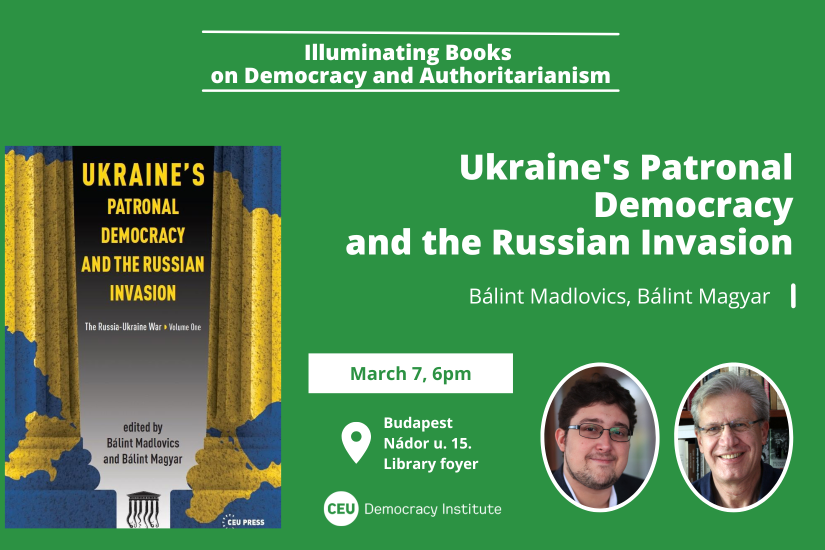
The De- and Re-Democratization (DRD) Workgroup of the CEU Democracy Institute cordially invites you to its second presentation of Illuminating Books on Democracy and Authoritarianism.
If you would like to attend, please register here.
If you would like to receive information about upcoming llluminating Books or other events organized by the Working Group, sign up for the DRD mailing list here.
Book:
Balint Madlovics, Balint Magyar (eds.): Ukraine's Patronal Democracy and the Russian Invasion (CEU Press, 2023)
The Russian invasion of Ukraine in 2022 jeopardizes the country's independence and its chances for Western-style development. However, the heroic attitude of the Ukrainian people, combined with a solidifying national identity, makes the domestic foundations for a western turn stronger than ever. After the invasion, building strong foundations of liberal democracy will be a top priority. In addition to alleviating immediate problems, the country must also address its post-communist legacy and address the constraints of patronalism.
The authors of this edited volume, leading Ukrainian scholars supplemented by colleagues from Hungary, examine the chances of an anti-patronal transformation after the war. The book provides an overview of the development of Ukraine's political-economic system: color revolutions in 2004 and 2014 brought democratic transformation, but no change in the patronage system The result was patronal regime cycles instead of the emergence of a Western-type liberal democracy in the country. Building on the conceptual framework of the editors' The Anatomy of Post-Communist Regimes (CEU Press, 2020), the 12 chapters examine the impact of the war on patronal democracy, the relational economy, clientelist society, and the international environment in which Ukraine operates.
Download the book here (open access).
Editors:
Balint Madlovics is a junior research fellow at the CEU Democracy Institute. He holds an MA in political science (2018) from Central European University, a BA in economics (2016) from Corvinus University, and a BA in sociology (2021) from Eötvös Loránd University. The research partner of sociologist and DI fellow Bálint Magyar, Madlovics is the co-author of The Anatomy of Post-Communist Regimes (CEU Press, 2020) and A Concise Field Guide to Post-Communist Regimes (CEU Press, 2022). He has published articles in peer-reviewed journals like Public Choice since 2019, and contributed chapters to various reports and volumes of studies since 2015.
Balint Magyar is a Senior Research Fellow at CEU Democracy Institute (since 2020), holding a University Doctoral degree in Political Economy (1980) from Eötvös Loránd University in Budapest. He has published and edited numerous books on post-communist mafia states since 2013. He was an Open Society Fellow for carrying out comparative studies in this field (2015-2016), Hans Speier Visiting Professor at New School (2017), Senior Fellow at CEU Institute for Advanced Study (2018-2019), and Research Fellow at Financial Research Institute (2010-2020). Formerly, he was an activist of the Hungarian anti-communist dissident movement, founder of the liberal party of Hungary (SZDSZ, 1988), Member of Hungarian Parliament (1990-2010), and Minister of Education (1996-1998, 2002-2006).
Discussants:
Júlia Király has been professor of finance and monetary economics since the 90s. She founded and managed the International Center of Bank Training and Consulting Budapest 1989-2007. She used to be the Deputy Governor of the MNB, the Central Bank of Hungary, responsible for financial stability and member of the Monetary Council during the crisis years (2007-2013). 2013-2021 professor Király was an independent member of the Board of KBC Banking and Insurance Group Belgium. On behalf of the European Commission she has been working in the Hellenic Stability Fund since 2015. She has several publications on monetary policy, banking and finance.
Edit Zgut-Przybylska is adjunct professor at the Institute of Philosophy and Sociology (IFIS) in the Polish Academy of Sciences (PAN) and a Research Affiliate at the CEU Democracy Institute. She received her PhD in Sociology from GSSR at IFIS PAN. She holds an MA in Political Science from ELTE TÁTK and graduated as a journalist at Bálint György Journalism Academy. Her research interest covers informality and populism in the context of democratic backsliding and the constraining role of the European Union. She published in peer-reviewed journals like the European Politics and Society and the Hague Journal on the Rule of Law. She is the Vice-Chair of Amnesty International Hungary and a visiting lecturer at the Foreign Service Institute of the US State Department. She previously worked at Political Capital Research Institute and prior to that, she was a journalist at various media outlets in Hungary.
Moderator:
Dóra Győrffy is Professor at the Institute of Economics at Corvinus University, Budapest. Her research intersects the fields of institutional economics, international political economy, public finance and European studies. She is particularly interested in problems of trust, populism and authoritarian influence especially in Central Europe.